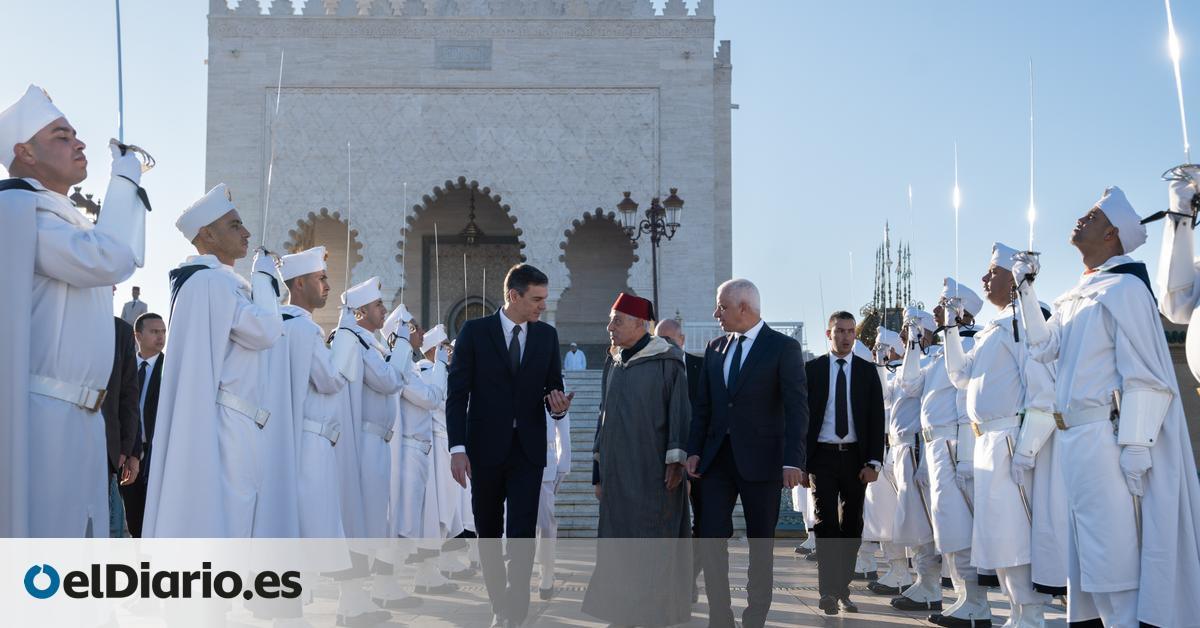
Support for the Moroccan position on the Sahara in exchange for respect for the Spanish sovereignty of Ceuta and Melilla. That is, broadly speaking, the main political and diplomatic commitment acquired between Spain and Morocco during the High Level Meeting held this Thursday in Rabat. Before the plenary of that meeting, the heads of government of both countries have been in charge of giving voice to that pact, each of them emphasizing their own claim and ignoring that of their neighbor. The Moroccan prime minister has spoken of the Sahara, which Pedro Sánchez has not mentioned. The same thing that has happened with Ceuta and Melilla, but in reverse.
Sánchez seeks to strengthen Morocco to increase the return of migrants after the false closure of the Melilla tragedy
More
“We have assumed a commitment to mutual respect whereby in our speech and in our political practice we are going to avoid everything that we know offends the other party, especially as it affects our respective spheres of sovereignty,” the president stated. Spanish president during his speech to outline the intention of both countries to establish a new phase of coexistence that puts an end to years of turbulence between neighbors.
From the moment that Sánchez and his eleven ministers set foot in Rabat, Morocco has made it clear that among these spheres of sovereignty, Spain’s support for its road map over the Sahara is a red line. The Moroccan prime minister already made it clear on Wednesday during his words at a business forum and this Thursday he has insisted on it again. “We welcome Spain’s position on our first national cause, which supports the Moroccan proposal for autonomy in the Moroccan Sahara, presented by Morocco in 2007, and which it considers to be the most serious, realistic and credible way to solve this artificial conflict,” he said. Aziz Ajanuch.
In his turn to speak, the Spanish president made direct references to Ceuta and Melilla, the autonomous cities that are the land border with the African country and that the Alaouite regime has always claimed as its own. The migratory crisis experienced at the Ceuta border in May 2021, when Morocco allowed the massive passage of hundreds of young people in an act that the Spanish Government itself described as an attack on sovereignty, was one of the high points of the diplomatic crisis unleashed in account of the entry into Spain of the leader of the Polisario Front, Brahim Gali, to receive medical attention. A clash that the Sánchez Executive intends to shelve definitively during this summit.
“I am very satisfied with the success of the first commercial expedition that took place last Friday through the customs of Ceuta and Melilla”, stressed the president, who has assured that he will “to guarantee together that these customs continue to open in a orderly and progressive until reaching the full normalization of the passage of people and goods, as we agreed last year”, he added.
In his speech, Sánchez highlighted the work carried out by both executives in the last ten months of thaw. “Today, with this High Level Meeting, we consolidate the new stage that we have opened in relations between Spain and Morocco. We do so with a great sense of responsibility and historical awareness and, above all, with the deep conviction of the enormous potential that remains to be explored in this relationship, which goes far beyond mere neighbourhood. We must do it for the benefit of our peoples. And we will only do it well if we do it together ”, he remarked.
The Spanish government is trying to downplay the fact that the agenda for this summit will not finally include a meeting between President Sánchez and the King of Morocco, Mohamed VI, outside the country. Both had a telephone conversation yesterday that was received by Moncloa as proof of the “involvement” of the monarch in this new stage between the two countries, insisting that the High Level Meeting was conceived, in any case, as a meeting “between governments ”.
Among the twenty bilateral agreements that both executives are preparing to sign, in Moncloa those that have to do with security and immigration control stand out, but also with the involvement of Spanish companies in the economic development of Morocco, with a business volume of 20,000 million euros in exports for a total of 17,000 Spanish companies involved.
Regarding Ceuta and Melilla, and despite the fact that the Moroccan government avoids ruling on an explicit recognition of Spanish sovereignty, for the Executive of Pedro Sánchez, the opening of customs at the border crossings of both cities represents a qualitative leap. In practice, an implicit recognition of that sovereignty, according to Spanish diplomatic sources. During the High Level Meeting, both countries have worked on a plan for the gradual opening of those customs. Executive sources assure that this commitment will appear in the signed agreements, although they admit that we will still have to wait to have a fixed calendar in this regard. In the coming months, a new meeting will take place at the highest level between the President of the Government and the King of Morocco, agreed upon during the conversation they held this Wednesday, although no date has yet been set.
Source: www.eldiario.es

